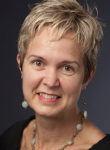Poetry's evolutionary niche at Cornell Plantations
By Linda B. Glaser

Consider an orchid’s foot-long spur and a moth’s 12-inch tongue stretching through the spur to reach the orchid’s nectar. Poet Joanie Mackowski sees in this biological oddity the same co-evolutionary process that gives us poetry.
She’ll explore this process for the Cornell Plantations’ William and Jane Torrence Harder Lecture Sept. 3 at 5:30 p.m. in Call Auditorium. The lecture, “You're the Bee's Kinesis: Poetry and Coevolution,” will include readings of poems by Mackowski and others and is open to the public.
“Co-evolution is a term for two different organisms evolving together,” explains Mackowski, associate professor of English in Cornell’s College of Arts and Sciences. “Organisms are marching along through time, evolving, and some do it in a reciprocal, collaborative way. Poetry, too, is a living thing: an organism that evolves with humans.”
2014 Fall Lecture Series
While the Cornell Plantations Fall Lecture Series is open to the public, it is also available as a one-credit class: HORT 4800. Students attend lectures, write a reaction paper and meet on non-lecture Wednesdays to discuss the previous week’s lecture.
The 2014 Fall Lecture Series dates:
• Sept. 3, 5:30 p.m., Call Auditorium - William and Jane Torrence Harder Lecture, “You're the Bee's Kinesis: Poetry and Coevolution,”Joanie Mackowski, poet and Cornell Professor of English. Garden Party at the Botanical Garden follows the lecture.
• Sept. 17, 7:30 p.m. Statler Auditorium - Audrey O’Connor Lecture, “The Drunken Botanist: The Plants That Create the World's Great Drinks,” Amy Stewart, author.
• Oct. 1, 7:30 p.m. Statler Auditorium -Class of 1945 Lecture, “Founding Gardeners,” Andrea Wulf, author.
• Oct. 15, 7:30 p.m. Statler Auditorium - Elizabeth E. Rowley Lecture, “Personal Habitat: Creating a Haven for Wildlife (and Yourself),” Julie Zickefoose, author/illustrator (in collaboration with the Cornell Lab of Ornithology and the Cayuga Bird Club).
• Oct. 29, 7:30 p.m. Statler Auditorium - Cornell Plantations 70th Anniversary Lecture, "A Living Sympathy with Everything That Is,” Scott Peters, Syracuse University.
• Nov. 12, 7:30 p.m. Statler Auditorium - William Hamilton Lecture, “An Introduction to Classical Bonsai Art,” Bill Valavanis, Bonsai Master.
According to Mackowski, poetry shares another similarity with living organisms: It’s a form threatened with extinction. She notes that many elementary and high school teachers do not feel confident teaching poetry, while poets and scholars often don’t articulate poetry’s value and purpose.
Sonja M. Skelly, Cornell Plantations director of education, says that the intent of the Harder Lecture is to have speakers who can bring together nature and literature. “Mackowski is a perfect fit, given her fascination with the natural world and its influence in poetry.”
An example of Mackowski’s poems, which often explore biology, evolution and perspective, is “When I Was a Dinosaur,” in which the stegosaurus says:
“I didn’t foresee the rubble
and the ice, the ages of seep and budge,
the wonder of photosynthesis….”
For Mackowski, writing poetry is a method of inquiry. “If I express in writing what I already know, then it’s not a poem. For it to be a poem, the writing process must teach me something. It must change my thinking, lead me to a new insight – the poem expresses this new insight.”
Reading poetry, too, she says, should have the same sort of surprise: one way to know a good book or, a good poem is that each time you read it you find something new.
Mackowski’s first book of poems, “The Zoo” (University of Pittsburgh Press, 2002), depends on formal structures (“I worked really hard on the rhymes, so no one notices they’re there,” she says). The volume received the Associated Writing Programs’ Award Series in Poetry and the Kate Tufts Discovery Award.
Her second book, “View From a Temporary Window” (University of Pittsburgh Press, 2010), also engages with formal poetic structures; it includes a sonnet sequence that responds to Petrarch, syllabic verse, alliterative accentual hemistiches (the form of “Beowulf”), to name a few. Recently, however, Mackowski has found herself writing free verse, which she says came as a surprise.
“Robert Frost wrote that writing poetry without meter was like playing tennis without a net,” notes Mackowski. “But to me now it feels more like swinging on a high trapeze without a net.”
Mackowski’s awards include a Wallace Stegner Fellowship, a Rona Jaffe Foundation Grant and the Emily Dickinson Prize from the Poetry Society of America. Her poems appear in “Best American Poetry 2007” and “Best American Poetry 2009,” “The Swallow Anthology of New American Poets” and in such journals as The Yale Review, Raritan, New England Review and Poetry.
The Harder Lecture is endowed by Torrence Harder ’65 and named in honor of his parents, William H. Harder ’30 and Jane Torrence Harder. The lecture is part of the Plantations’ Fall Lecture Series, which includes five other speakers addressing topics from creating a wildlife and personal haven to the art of Bonsai.
Linda B. Glaser is staff writer for the College of Arts and Sciences.
Media Contact
Get Cornell news delivered right to your inbox.
Subscribe